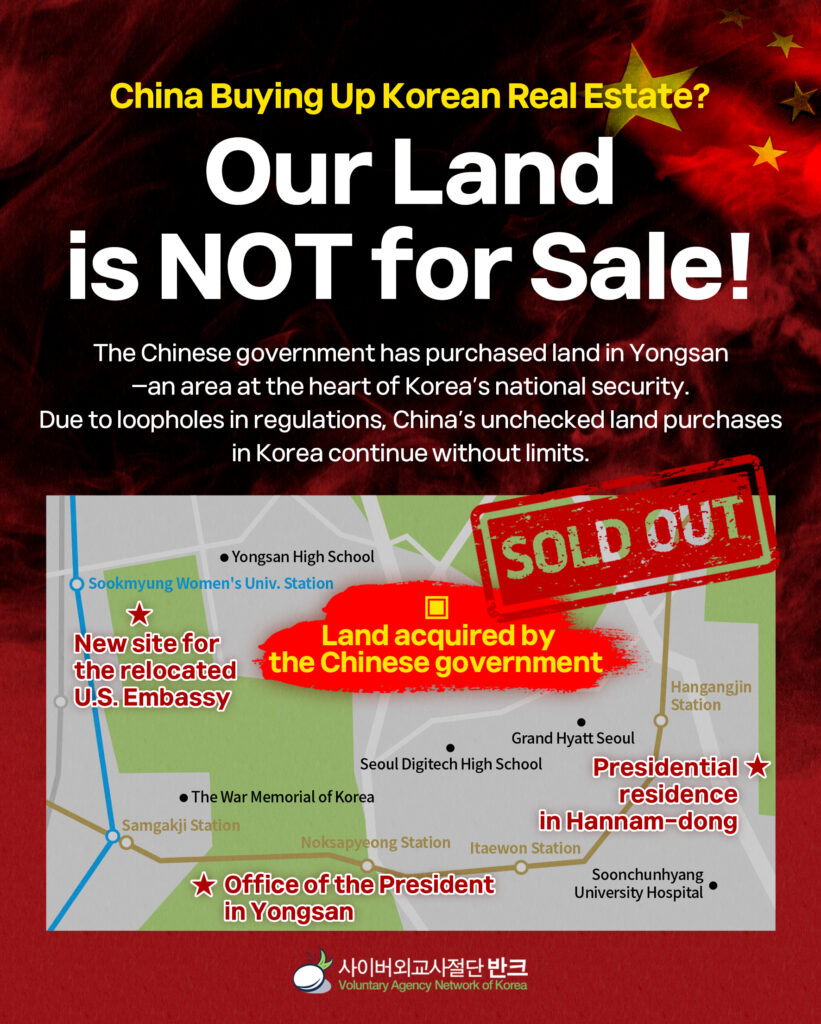
The Cyber Diplomacy Organization VANK has launched a campaign to protect Korea’s land sovereignty and national security following revelations about the Chinese government’s purchase of real estate in Yongsan, Seoul.
In December 2018, the Chinese government purchased 11 plots of land (4,162㎡, approximately 1,256 pyeong) in Itaewon-dong, Yongsan District, for around 29.9 billion KRW. The property is located only 1–1.5 km from the Presidential Office (Yongsan Complex), the presidential residence (Hannam-dong), and the future site of the U.S. Embassy relocation (Camp Coiner). It also sits above the GTX-A metropolitan express railway line, making it a highly sensitive location for both security and diplomacy.
What alarms VANK is that this significant acquisition by a foreign government remained undisclosed for over six years. Official land registry records show the buyer as the “People’s Republic of China,” marking the first known case of a foreign government directly owning prime land in central Seoul. Some of the land originally belonged to the Korean government but was sold to a private individual in 2017, and within just 18 months, transferred to China—without proper oversight or institutional safeguards. Today, the site remains largely abandoned, with empty buildings and closed facilities, while the Chinese Embassy has vaguely described it as “land for official embassy use” without revealing specific plans.
VANK argues that this is not just a real estate transaction but a structural issue threatening national sovereignty, security, and diplomatic balance. Unlike countries like the U.S., Canada, and Australia, which strictly regulate or require government approval for foreign property acquisitions on national security grounds, Korea has no pre-screening or restrictions for foreign governments. This creates a diplomatic asymmetry, as China completely prohibits foreign ownership of its own land while freely purchasing property in Korea.
The problem extends beyond this case. According to the Ministry of Land, Infrastructure and Transport, Chinese nationals owned 20.66 million m² of land in Korea by 2022—seven times the size of Yeouido—and the figure is steadily rising. In 2023, 64.9% of all foreign real estate acquisitions in Korea were by Chinese buyers, raising alarms about unchecked foreign capital acquiring Korean territory.
VANK is urging the introduction of a pre-screening and approval system for foreign government and individual property purchases, along with reciprocal regulations based on the principle of “mutuality.” It calls for urgent legislative and institutional measures to address this imbalance, a full investigation into foreign government-owned land in sensitive areas, and transparent disclosure of all related information.
Moving forward, VANK plans to continue raising public awareness of foreign encroachments on Korea’s land sovereignty and push for systemic reforms to safeguard national assets. VANK emphasizes that protecting the nation’s land sovereignty is not solely the responsibility of the government or the National Assembly but a collective duty of all Korean citizens.